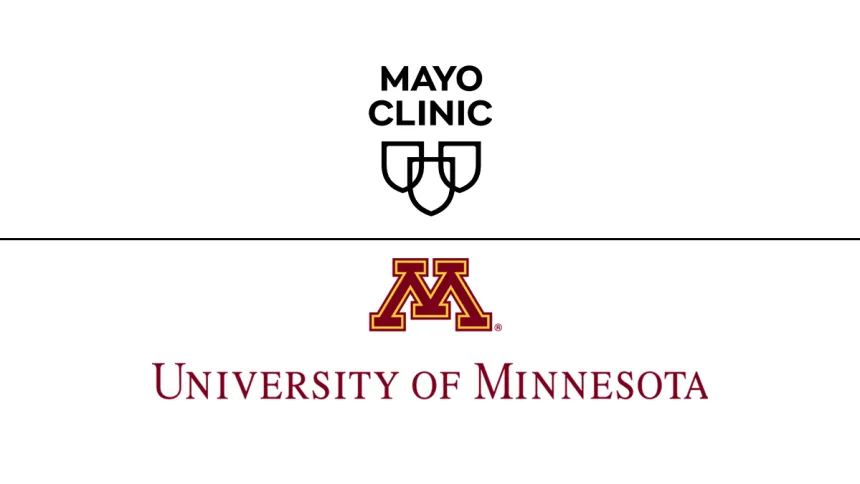ROCHESTER, Minn. — The Minnesota Partnership for Biotechnology and Medical Genomics (MNP) has announced its four research awardees for 2024. MNP is funded by the State of Minnesota and provides support for innovative research conducted by teams from the University of Minnesota (UMN) and Mayo Clinic.
Totaling $3 million, this year’s awards support innovative projects on cognitive aging, cardiovascular disease, cancer and pulmonary hypertension.
They are:
An essential role for complement signaling in microglia on diet-induced hypothalamic neuroinflammation, neurodegeneration and aging-associated cognitive impairment.
Co-Principal Investigators: Alessandro Bartolomucci, Ph.D. (UMN), Darren J. Baker, Ph.D. (Mayo Clinic)
Obesity increases a patient’s risk of developing neurodegenerative diseases such as Alzheimer’s disease (AD). However, the mechanisms linking obesity to AD remain unclear. Research has shown that obesity drives inflammation in the brain by activating a type of neuro-specific immune cell called microglia. Complement 3a receptor 1 (C3aR1) has been shown to mediate immune responses in many cell types, including microglia, in many disease states, including obesity. This project aims to determine whether blocking C3aR1 can reduce obesity-induced neuroinflammation and cognitive decline. If successful, the findings could identify a potential new drug target for AD.
Macrophage networks and checkpoints in cardiovascular disease.
Co-Principal Investigators: Esther Lutgens, M.D., Ph.D. (Mayo Clinic), Jop van Berlo, M.D., Ph.D. (UMN)
Inflammation is a key driver of cardiovascular disease (CVD), with macrophages being one of the primary cell types responsible for this inflammation. Immunotherapies that reduce macrophage activation may help lower the incidence of cardiovascular events in patients. There are various subtypes of macrophages, and this project aims to identify which subtypes contribute to the progression of atherosclerosis and heart failure. Specifically, the team will investigate whether immunotherapies targeting macrophage subtypes expressing immune checkpoints can inhibit the progression of atherosclerosis and heart failure. If successful, the project could lead to the discovery of new drug targets for CVD.
Also Read : KPJ Healthcare Clinches Triple HR Awards for Excellence in Human Capital
Identifying T cell subsets contributing to immune related adverse events caused by immunotherapy.
Co-Principal Investigators: Vaiva Vezys, Ph.D. (UMN), Laura M. Rogers, Ph.D. (Mayo Clinic)
Immune checkpoint inhibitors (ICIs) are groundbreaking cancer treatments and are now widely used as the first option for many types of cancer. However, there’s no way to predict which patients will respond well to ICIs, and serious side effects — called immune-related adverse events (irAEs) — occur in about 55% of patients. These side effects happen because ICIs activate T cells, a type of immune cell, which can mistakenly attack healthy parts of the body while targeting cancer. This project will use a new mouse model, developed by the team, to study how specific subtypes of T cells contribute to the side effects caused by ICIs. If successful, the research could lead to new tools to predict and reduce side effects, improving cancer treatments for many patients.
Understanding Endothelial-to-Mesenchymal Transition (EndMT) in Vascular Remodeling of Pulmonary Hypertension.
Co-Principal Investigators: Aleksandra Babicheva, Ph.D. (UMN), Christina Pabelick, M.D. (Mayo Clinic)
Pulmonary hypertension (PH) is a serious, progressive disease defined by high arterial pressure in the lungs and has limited treatment options aside from a lung transplant. One type of PH, called Group 3 PH, is linked to low oxygen levels (hypoxia) and affects the largest number of patients. Unfortunately, these patients tend to have the poorest survival rates, and there are currently no effective medications to treat it. In PH, the blood vessels in the lungs become narrowed and damaged over time, making it harder for blood to flow, which is known as vascular remodeling. One process involved in vascular remodeling is called endothelial-to-mesenchymal transition (EndMT), where endothelial cells take on characteristics of mesenchymal cells (smooth muscle cells and fibroblasts), which are more pro-fibrotic. This study aims to mechanistically evaluate how hypoxia and specific vascular remodeling processes play a role in Group 3 PH. If successful, this research could help identify a new treatment to prevent or slow down the damage to lung blood vessels in PH patients



















